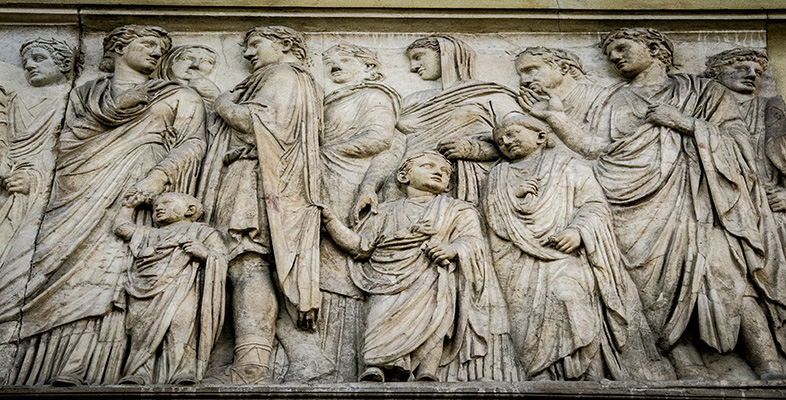Literature
This doesn’t have the kind of physical presence that material evidence does, but it has a different strength: it gives us, more literally, voices from the past. We can, as it were, hear the ancient Greeks and Romans speak, about what happened, about how they felt, about what they thought, and experience how they expressed themselves. This gives us a rather different access to their world, complementary to the one we get from material culture.
Like the word ‘arts’, literature can suggest aesthetic pleasure. Theatres, like galleries, aren't places where we study evidence but where we enjoy good writing and acting, and this course will give you plenty of opportunity to do just that. But we want to stress again that literature, at the same time, can serve as a source of information about the past. The sorts of questions you might ask about Homer as a source aren't unlike those we just went through for pots. Homer depicts a particular society. You might ask what you can learn from this depiction of early Greek society. You might further ask why Homer chose to depict society by writing long poems (epics), and what sort of world it was in which these kinds of poem were apparently a dominant genre of literature. Furthermore, much Classical literature (especially in the earlier periods) was performed rather than read. So you might ask who performed the epics of Homer, who listened to them, where these performances took place, who (if anyone) paid for them, and how these contexts will have shaped Homer's poetry.
Again, we’d like to stress one particular risk. The very explicitness of literature – the fact that you can read it – can be deceptive. The nature of Homer’s society is a hugely contested issue. Is it contemporary society Homer is describing? Is it an earlier kind of society that Homer (just like us) explores on the basis of knowledge that has somehow come down to him? If it is, does the fiction still tell us something about real societies? Moreover, what sort of voice is Homer's? Was he part of an elite? In that case, how is what he says biased by this fact? Or was he influenced by what his audience wanted to hear? Along with the vast majority of ancient voices we hear through literature, Homer’s is a male voice; and even most of the far fewer female voices we do hear are written down or even invented by men. The point may be extended to say that we only hear the voices of the literate, a small minority in the ancient past, and so literature can never be representative of the totality of society. As ever, unmediated access to the ancient world is impossible.
